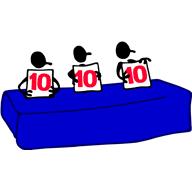|
What are the top ten questions?
The top ten questions and other common interview questions broadly speaking are fairly predictable as one thing we do know is that interviewers are all looking for the same thing:-
Ten Most Common Questions Once you have worked on the Top Ten Questions we have over a hundred more questions for you. Click on any of the links below and you will be taken directly to the right place. Top Ten questions about:- Skills The interviewer is testing whether you can actually do the job. Skills are the things you can do or the abilities you have. Interviewers often exchange the word skills for ‘competences’. Often the interviewers will have a list of skills, abilities or competences they require. The interview questions are your chance to demonstrate you have these skills. Skills can be:- job specific e.g. operating the tills, designing a website, filling teeth, editing a newspaper or they can be general & apply to many jobs e.g. communicating with people, presenting information, using the telephone Your answers will need to show positively that you have whatever skill is being tested. It will be helpful to be able to illustrate your answer with an example
The interview is testing whether your experience equips you to rise to the various challenges of the job. Interviewers are looking for reassurance that you have experience from your previous work, voluntary work or from your life in general. You need to explain how your experience has prepared you for the vacant position. They are not looking for the whole story just the key points that will persuade them you will be able to fit in and do the job successfully.
Does your background lend you to the type of work on offer. There might be something about growing up, at school or college that is relevant to the job in some way. For example you might have worked in the voluntary sector, have a long interest in the legal profession or with campaigning groups or an involvement in sport. This is not necessarily having a job but being involved and pursuing activities that relate to that field. For example you might want to be a doctor and you have taken every opportunity to be a first aider, been a hospital volunteer, taken relevant courses and may have family members who are in the profession. It doesn’t mean you can do the job but that you have an understanding of the needs of the profession. If you really cannot think of anything you will need to get creative. When we are coaching we learn to dig a bit deeper and can generally root out something highly relevant that the client has almost forgotten about or not thought important. Think hard and ask yourself or even better, get someone else to ask you 'What have you done in your life that makes you want to do this job / or be able to do this job?'
The interview is testing whether you have the knowledge, training, education and qualifications you need for the job. Whist many employers accept that you may not have all the knowledge to do their job they will be looking to minimise their training expenditure and the time spent training you. This means they will want to make sure that you have the knowledge you can reasonably be expected to have. This will include technical knowledge and knowledge of that particular industry or niche. Your qualifications will be listed on your application form or CV but be prepared for any questions about why you chose them. Do not lie about your qualifications. In most cases they can be easily verified. The other area of knowledge you will need is information about the company itself. Do not be caught out by the question 'What do you know about us?' Do as much research as you can via company reports, brochures and website. Ask around to see if anyone you know has worked there before so you have some 'insider' knowledge. Weaving what you know about the company into your answers, drawing parallels from your own experience will always impress.
The interviewer is working out whether you have the right sort of personality to fit in with your colleagues and the company itself. Fitting into the workplace is high on an interviewers tick list. In nearly all jobs even if you are based at home the interviewers will want to know that you can get on with people and are flexible enough to meet the demands of the job. Some of this is out of your control as you cannot change the people you are expected to fit in with but there are some points worth bearing in mind. As a minimum show the Interviewer that:
Click here for our Top Ten Personality Questions And also that you are going to be Motivated and committed to the job if it is offered to you. The interviewer is testing whether you will be motivated and committed to the job and whether your long term plans mean you are likely to stay with the company. Depending on the seniority of the job they may also assess how you might develop the job and role in the future

If you consider the interview from the employers’ point of view. it will help you think through your best answers. The interviewer has only limited time to arrive at a decision about who is the best candidate from the shortlist. All candidates are likely to be asked similar questions so their answers can be compared and contrasted. That is why in the main the majority of the interview will focus on the top ten questions and versions of them. It is estimated that the Top Ten Questions will make up about 75% of the interview. The rest will be questions related more to the precise job, often areas of technical or professional knowledge. Of course you need to swot up on your subject if you suspect a technical or knowledge-based discussion is likely. However preparing to answer the frequently asked top ten questions will help calm your nerves and give you confidence. Furthermore if the predictable ones are answered convincingly and authentically they will disguise any moments when you feel less sure of your answers.
Go from Top Ten Questions to Interview Questions
|

